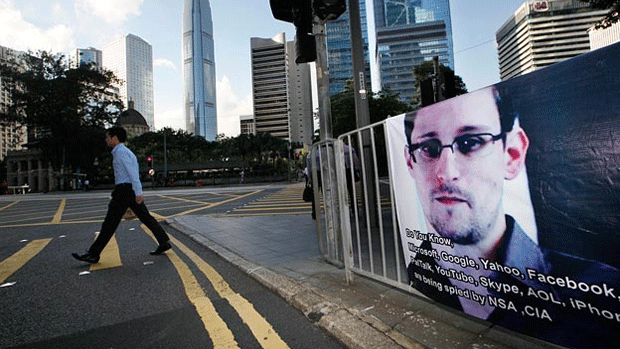The pursuit of Edward Snowden

Edward Snowden is one of the great heroes of our time, risking his life to expose government lies and hypocrisy. Snowden remains in Russia, but the US is determined to put him on trial – and lock him away for years – for espionage.
His political journey is an interesting one because he didn’t start out as a radical, but was transformed through experience.
In 2003, while millions protested against the looming US invasion of Iraq, Snowden enlisted in the US army. He later told Guardian journalist Glenn Greenwald this was to “help free people from oppression”. However, his doubts began early. “Most of the people training us seemed pumped up about killing Arabs, not helping anyone”, he said. Before seeing combat, he was discharged after breaking both legs in training.
Snowden began working in IT security for the CIA, and later for the defence contractor Booz Allen Hamilton with the National Security Agency (NSA). The information he was exposed to further transformed his ideas. For example, he witnessed undercover CIA agents blackmail individuals to obtain information. “I realised that I was part of something that was doing far more harm than good.”
What pushed Snowden to go public was the unprecedented and growing level of state surveillance. He had hoped that the election of Barack Obama in 2008 would change things, but instead the NSA’s and CIA’s powers expanded. At this point Snowden realised that “you can’t wait around for someone else to act. I had been looking for leaders, but I realised that leadership is about being the first to act.”
After collecting as much information as he could, Snowden took a few weeks off and travelled to Hong Kong to meet journalists Glenn Greenwald and Ewen MacAskill and documentary film-maker Laura Poitras. He wrote in a note with the first batch of documents to Greenwald, “I understand that I will be made to suffer for my actions … [but] I will be satisfied if the federation of secret law, unequal pardon and irresistible executive powers that rule the world that I love are revealed even for an instant.”
Snowden has exposed that the US has developed the largest and most complex system of state surveillance that has ever existed.
Under one program, called PRISM, the NSA had for years been freely accessing the systems of Google, Facebook, Apple, Microsoft, Yahoo, Skype and other corporations. All of our “private” online data was fully accessible. Its systems allowed the agency to store the complete online internet history of all citizens and to monitor anyone’s communication in real time.
Not simply confined to spying on US citizens, the NSA has the full support of five loyal countries called “The Five Eyes”. They are the US, UK, Canada, Australia and New Zealand. It has now been revealed that, since 2001, Telstra has been routing large sections of Australian internet traffic straight to the US for storage and surveillance.
The NSA thought it would get away with this, but it wasn’t counting on rebellion in its own ranks. Snowden is a reminder that the NSA and the US government are reliant on regular workers to develop the hardware and software to do their dirty work. These workers can, and do resist. Their actions are a testament to Bertolt Brecht’s words from a 1930s anti-war poem written in Nazi Germany: “General, man is very useful – he can fly and he can kill. But he has one defect: He can think.”
Or, in Snowden’s words: “I’m willing to sacrifice … because I can’t in good conscience allow the US government to destroy privacy, internet freedom and basic liberties for people around the world with this massive surveillance machine they’re secretly building.”
Edward Snowden is a hero and should be an inspiration to anyone who wants to see a better world.
The author can be contacted at michael.kandelaars@gmail.com using this public key if encryption is required.